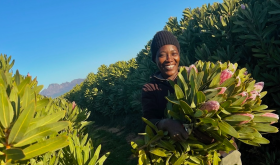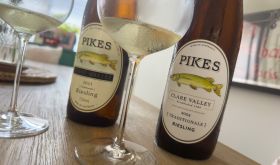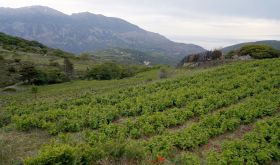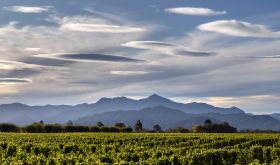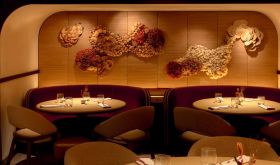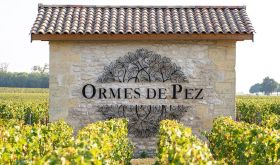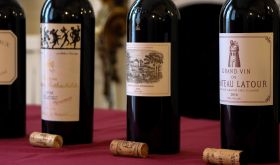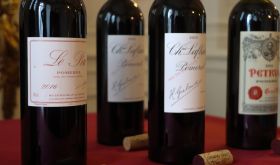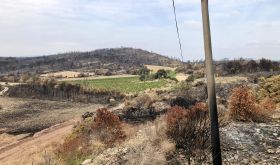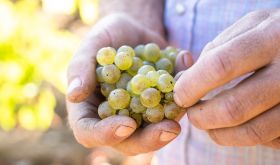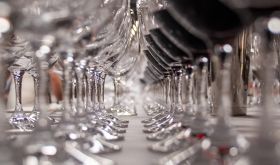From €6.75, 16.50 Swiss francs, $21.99, £18.50 a bottle or 165 Norwegian kroner a half.
I was in Madrid earlier this week for a wine panel that was part of a Financial Times event and met many a wine writer there. A few professed themselves dispirited by my recent rather pessimistic review of the state of sherry. I got the heartening impression that, in the Madrid wine community at least, some sherry-flavoured green shoots are to be found.
I was delighted therefore to discover, at the Spanish launch of my glassware at Lavinia wine store and restaurant in Madrid, a really excellent sherry producer that was new to me. (And I was heartened to see a score of 17.5 for one of their sherries from our Spanish specialist Ferran Centelles, reporting on Victor de la Serna's favourite Spanish wines, and 17 from Julia for another that was shown at our Sherry Night a couple of years ago.)
Brothers Pepe and Paco Blanco (pictured) founded Callejuela in 1998 in Sanlúcar de Barramada and released their first Callejuela sherry in 2005. The two brothers are the third generation of growers and owners of a small sherry bodega, an almacenista selling wine to the bigger producers. Their father Francisco Blanco founded the small winery in 1980 and developed a solera based on his 5 ha (12 acres) of vines.
Today they have a total of 28 ha (69 acres): in Jerez 4.5 ha in the famous Macharnudo vineyard and 8.5 ha in the Pago Añina, and in Sanlúcar 16 ha in their La Callejuela vineyard in Pago Hornillo. Most of these plantings are Palomino Fino vines on the white chalky albariza that characterises the best sherry country but they recently planted some Pedro Ximénez vines to produce a sweet PX. They are typical of the new movement described by Julia where the main focus is on vineyards (as Peter Sisseck of Pingus described his new Fino operation in Jerez referred to in Gems of Andalucía ignored).
They moved into the current bodega in 1997 and, because it is in Sanlúcar, all their sherries must be called Manzanilla, even if they are based on grapes grown in their vineyards that are technically in Jerez rather than Sanlúcar. Nowadays they manage 700 butts with a modest solera, and produce Manzanilla Fina, en Rama, Pasada, Añada, Amontillado, Oloroso and PX. They also produce three still wines based on Palomino aged under flor and three different single-vineyard sherries, about 1,800 bottles of each. No cultured yeast is added and wines are left for six months under flor in the 500-litre butts.

It was the contrast between the darker, more robust Callejuela, Macharnudo Manzanilla 2014 and the lively Callejuela, Añina Manzanilla 2014, both 16% alcohol, that really caught my attention. (The vintage is given in Roman numerals on the front label.) But before then I had already been really impressed by Callejuela, Blanquito Manzanilla Pasada NV, the product of 12 years' ageing, which showed such depth of flavour and complexity. I found myself entranced by it and wanting to return to again and again. All three wines are sold in 50-cl bottles and cried out for food. Lavinia charge €15.62 per half-litre for the Blanquito and it's available in Canada for CA$35.50.
-2.jpg)
The least expensive way of tasting the brothers' fine work is the three-year-old Callejuela, Manzanilla Fina NV. According to Wine-searcher.com, it is widely available in Spain and also in Belgium, Ireland, Norway and the US and I managed to get my hands on one of the 75-cl bottles in which it is sold at Bottle Apostle, Primrose Hill, London, who charge £18.50 for it. It's a fine 15% blend of wine from the brothers' two Jerez vineyards and their La Callejuela vineyard in Sanlúcar that is much more substantial on the palate than many Manzanillas with a light, refreshing bready nose and some characterful bite on the finish.
The UK's importer of Callejuela wines is Iberian Drinks of south London. They have a website from which the picture is taken and on which orders are taken but they specialise in selling to restaurants so like to sell at least six bottles at a time. They have, however, supplied this list of stockists, a mixture of on and off trade: Bottle Apostle, Gnarly Vines, L'Oculto, L'Oculto Brockley, Kaltur Food of Newcastle, Flavours of Spain, Viandas of Bristol, Lyle's, Tabanco of Cambridge, Tabanco Drakes of London, The Tapas Room of Tooting, Barrica of London, Last Drop Wines, The Larder House of Bournemouth, Robert and Henry Fine Wines of Liverpool, Trangallan, Ametsa restaurant in The Halkin in London, Crouch End Cellars, Bellita of Bristol and Canaletes of Kilburn. They are about to move from 2014 to 2015 for the Macharnudo and Añina single-vineyard bottlings.
In the US, Callejuela wines are imported by La Luz Selections, and by Bonhomie in New York. Wine-Searcher identifies quite a wide range of US retailers.
Spain is the best place to buy them, of course, but there are also stockists in Belgium, Switzerland, Austria, Norway, Ireland, Australia and Canada with a particularly wide range, including the table wines, in Belgium, Norway and Australia.



